山东省潍坊高新技术产业开发区浞景学校九年级英语下册 Moudle2 unit1学案
九年级英语外研版下module-2-Unit-2.教案设计

Unit 2 What’s the best thing about school?【教材分析】通过读、写训练,学习描述学校的生活。
该单元共设计了7个活动。
其中活动1要求学生描述所给图片。
活动2—4要求学生阅读介绍学校生活的短文,完成相应的练习。
活动5-7要求根据范文写出关于你的学校生活的文章。
Teaching aims1. Knowledge objective:Key vocabulary and key structures2. Ability objective: To get information about school life; To know the way of writhing about the school life.3. Moral objective: To know more about western school life and respect the western educational culture.Teaching points:1. Main points:1) Key vocabulary: secondary school, present, absent, speech, biology,safety, fortunately, drug, Spanish, French, involve, training, athletics, society, disco.2) Key structures: --- Sentence structure.2. Difficult points: How to improve the skills of reading and writing.Teaching procedure:Step 1. New words and Lead-inRead the new words and finish the exercises.Make students ask and answer questions about their school.Step 2. Look and sayThe teacher asks the students look at the photos and say what they can see. Have a discussion.Step 3. Reading1.Fast readingRead the passage quickly and match the paragraphs with their headings.2.Detail readingLet Ss read the passage and answer the questions.1) How long has Susie been at River School?2) How long does her schoolday last?3) Do all the students at River School have the same subjects?4) How do you like Susie’s school life? Why?3. Look through the passage and choose the correct answers.(1). River school is a _____ school. A. Primary B. Secondary C. High(2). How long do they have for the lunch?A. From 11:05 to 11:20B. An hour.C. Two hours(3). What subject don’t they have? A. PE B. IT C. Chinese(4). How often do they have a parents’ meeting?A. Once a month.B. Once a year.C. Once a term.4. Let Ss read the passage again and put the statements into the correct group.1) Susie has been at school since she was five and she will be at school until she is eighteen.2) All schools in the UK are like River School.3) Lessons start at 9:05 am.4) The fourth lesson starts at 1:15 pm.5) There is a parents’ meeting each term.We can get the information from the passage directly: ___________We can get the information from the passage indirectly: ___________ We cannot get the information from the passage: ____________Step 4 watch and readStep 5 phrasesAsk students to underline the phrases.Step 6. Writing1. Make the students make a list of other events and activities during your school year.2. Ask them to discuss in group.Step7. 课堂小结,布置作业1. Write a composition describing your school life.2. Make some students read their productions.教学反思本模块的中心话题是“教育”,内容主要涉及学校生活。
九年级英语下册Module 2 Education Unit 2
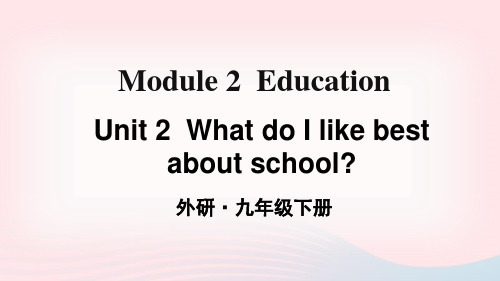
River School is a secondary school, ab中o学ut twenty minutes away from my home by bike. Before I came here, I
3. The _b_e_l_l_
is ringing. Is anyone
_a_b__se_n_t__ from class? Let’s begin our
class now.
Free talk
Talk about your school life You can talk about it in the following
Susie Thompson’s school life
River School, a(n) (1) Where she studies __s_ec_o_n_d_a_r_y__ school
School time
From (2) __8_:_4_5_a_m___ to 3:15 pm
How many subjects (3) ___T_e_n____ she studies
பைடு நூலகம்
Task 3: Read the passage and choose the correct answers.
1. River school is a ______ school. A. Primary B. Secondary C. High
2. How long do they have for the lunch? A. From 11:05 to 11:20 B. An hour. C. Two hours
九年级下册英语m2u2知识点
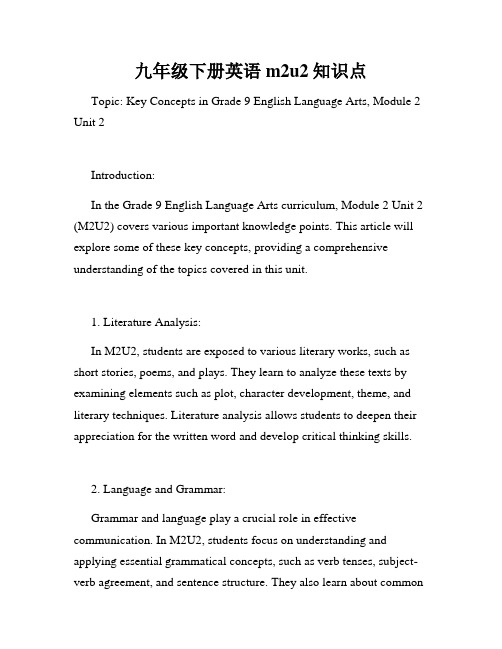
九年级下册英语m2u2知识点Topic: Key Concepts in Grade 9 English Language Arts, Module 2 Unit 2Introduction:In the Grade 9 English Language Arts curriculum, Module 2 Unit 2 (M2U2) covers various important knowledge points. This article will explore some of these key concepts, providing a comprehensive understanding of the topics covered in this unit.1. Literature Analysis:In M2U2, students are exposed to various literary works, such as short stories, poems, and plays. They learn to analyze these texts by examining elements such as plot, character development, theme, and literary techniques. Literature analysis allows students to deepen their appreciation for the written word and develop critical thinking skills.2. Language and Grammar:Grammar and language play a crucial role in effective communication. In M2U2, students focus on understanding and applying essential grammatical concepts, such as verb tenses, subject-verb agreement, and sentence structure. They also learn about commongrammatical errors and how to avoid them. By mastering these language skills, students become more confident in their written and spoken communication.3. Vocabulary Building:An extensive vocabulary is essential for understanding and expressing oneself effectively. M2U2 introduces students to new words and phrases through reading and writing activities. Students learn strategies for deciphering word meanings through context clues, prefixes, suffixes, and word roots. Building a robust vocabulary enhances students' language skills and overall academic performance.4. Speaking and Listening Skills:Effective oral communication is vital in all aspects of life, including classroom discussions, presentations, and social interactions. In M2U2, students engage in activities that aim to improve their speaking and listening skills. They practice expressing their thoughts clearly, actively listening to their peers, and engaging in meaningful discussions. These skills not only strengthen their ability to communicate but also foster empathy and understanding.5. Writing Skills:Writing is a powerful tool for self-expression and communication. In M2U2, students refine their writing skills by exploring different genres, such as narratives, persuasive essays, and research papers. They learn how to generate ideas, organize thoughts, develop coherent paragraphs, and revise their writing for clarity and coherence. Strong writing skills are transferable across subjects and are essential for academic success.6. Reading Comprehension:Reading comprehension is a fundamental skill that influences learning in all subjects. In M2U2, students practice various reading strategies such as skimming, scanning, and making inferences to improve their comprehension. They learn to identify main ideas, understand textual evidence, and critically evaluate the reliability of sources. These skills empower students to become independent and lifelong readers.7. Media Literacy:In the digital age, understanding media messages has become increasingly important. M2U2 introduces students to media literacy by analyzing the effect of media on society and personal identity. They learn to critically evaluate advertisements, news articles, and online content, considering factors such as bias, credibility, and audiencemanipulation. Media literacy equips students with the skills for responsible consumption and production of media content.Conclusion:The Grade 9 English Language Arts curriculum, Module 2 Unit 2, covers an array of knowledge points that are essential for students' language development. From literature analysis and grammar to vocabulary building and media literacy, students gain valuable skills that will benefit them in their academic and personal lives. By mastering these concepts, students become more effective communicators, critical thinkers, and lifelong learners.。
外研版英语九年级下册-Module 2 Unit 2 (课件)
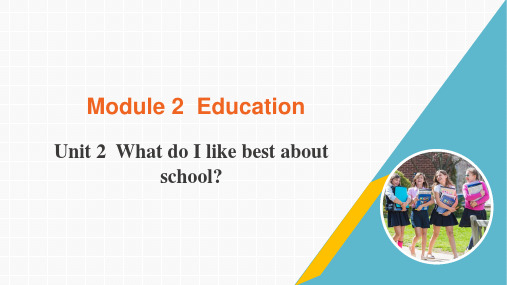
Complete the passage
Ask and answer in pairs 1. When do you hear a bell at school? 2. Who is absent from school today? 3. What do you usually do on weekdays? 4. How many marks do you need to pass the English exam?
14
Writing
Make a list of other events and activities during your school year.
The list of other events and activities during your school year:
… … …
15
Writing
10
Complete the passage
Read and complete the questions with the words in the box.
absent bell pass weekdays
1. When do you hear a ___b__el_l____ at school? 2. Who is __a_b_s_e_n_t___ from school today? 3. What do you usually do on _w__ee_k_d__a_y_s_? 4. How many marks do you need to ___p_a_s_s____ the English exam?
What can you see? What are they doing? There are some students. They are having a chemistry class. They are doing a chemistry experiment.
新外研版九年级英语下册 Module 2 Unit 2 课件
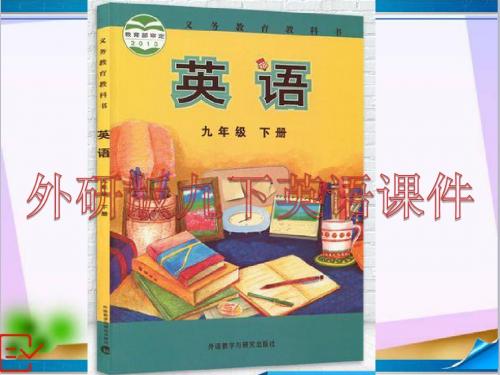
She has been at River School for four years. 2. How long does her schoolday last?
Her schoolday lasts for 6.5 hours, starting
Patterns: We go to school every weekday from
8:45 am to 3:15 pm.
We have a large sports ground for
football and tennis, where we can play
both during and after school hours.
We have a large sports ground for football and tennis, where we can play both during and after school hours. After-school activities, such as sports clubs and language societies, are popular too. During the school year there are usually visits to museums and to camps for activities such as climbing and walking in the country. Last year a group of us even went to Japan. There are parties and a sports
a break from 11:05 am until 11:15 am, then another lesson, and then lunch for an hour. In the afternoon, we have two more lessons before school finishes. This year I have ten subjects: maths, English, physics, chemistry, French, history, geography, music, IT and PE. Some people learn German instead of French. It’s lucky we don’t have exams in every subject.
【小初高学习】九年级英语下册Module2EducationUnit2WhatdoIlikebest

Module 2 EducationUnit 2What do I like best about school?Step 1Lead in (Activity 1)Ask the students to look at the pictures in Activity 1.T: What are the persons in the pictures doing?S1:…T: Have you ever experienced the same activities in your school life?S2:…The aim of this step is to arouse as many as students' own experiences and according to exchange of information among themselves, the students will get to know more about different dimensions of school life.Step 2Free talkAsk some students to describe some parts of their own school lives. As all their school lives are familiar among all the students, this step can attract students' interests in the topic.You can talk about it from the following aspects:1.Your school2.Your schoolday3.The subjects and the exams5.The other events and activitiesStep 3ReadingFirstreadingPlay the tape and ask the students to follow the text. After it, they are supposed to choose the correct answers to the following questions:1.River school is a ________ school.A.Primary B.Secondary C.High2.How long do they have for the lunch?A.From 11:05 to 11:20.B.An hour.C.Two hours.3.What subject don't they have?A.PE. B.IT. C.Chinese.4.How often do they have a parents' meeting?A.Once a month. B.Once a year. C.Once a term.Answers to the questions: 1-4 BBCCSecond readingRead the passage again and answer the questions in Activity 2.and Activity 3.Sample answers to Activity 2:1.She has been at River School for four years.2.Her schoolday lasts for 6.5 hours, starting from 8: 45 am and finishing at 3: 15 pm.3.No, not all the students at River School study the same subjects.4.I like Susie's school life because she has many afterschool activities.Sample answers to Activity 3:We can get the information from the passage directly:__3,5__We can get the information from the passage indirectly: __4__We cannot get the information from the passage: __1,2__Third reading[Reading skill: summarizing —— there are two levels of summarizing. One is summarizing the meaning of a whole passage; the other is summarizing the meaning of each paragraph.]Ask the students to read the text again and for this time, they are asked to summarize the meaning of each paragraph. (Teacher can divide the students into groups and each group summarizes one paragraph.)S1: Selfintroduction of Susie.S2: My primary school and my secondary school—River School.S3: Timetable for schoolday.S4: Subjects and exams.S5: Activities.S6: Conclusion—I like my friends best!Step 4PracticeHelp the students to learn the main words in this unit and this time they need to finish Activity 4.[答案]1.bell 2.absent 3.weekdays 4.passStep 5Writing (Activity 5-7)Teach the students how to make a time table for everyday school life and a long term timetable for a term's school life.Activity 6 List of events:1.English speech competition;2.Playing chess;3.Playing Pingp ong;4.Film appreciation;5.SwimmingWrite a passage about your school life. Use the timetable in Activity 5 and the list you made in Activity 6 to help you.Say:● when you go to school● how you get there● how long you have been at this school● what you r daily timetable is● what subjects you are taking this term● what other events and activities there are during your school year● what you like best about schoolSample answer to Activity 7Hi! I am a girl. I'm fourteen years old. I come from a small village of Guangxi.I am a student of Class 1, Grade 2.My school life is very interesting. Class begins at 7:45 am. I have five classes in the morning. In the afternoon, I often have two or three classes. We learn Chinese, English, maths, history, biology, geography, politics, physics and so on. I learn them with great interest. I like PE best because having sports is good for us and builds us up.Step 6Language points(详解见学案部分)Ⅰ.重点短语be present;last for;instead of;have a breakⅡ.重点句型If I pass my exams next year, I'll stay here until I'm eighteen.; Each lesson lasts for an hour,; In the afternoon, we have two more lessons before school finishes,; Some people learn German instead of French,;…none of them can tell tus what to do.Step 7Homework1.Learn the new words by heart.2.Describe your school life in your own words. (The passage in this module is a model for you to use)Blackboard design。
山东省潍坊高新技术产业开发区九年级英语下册 Moudle
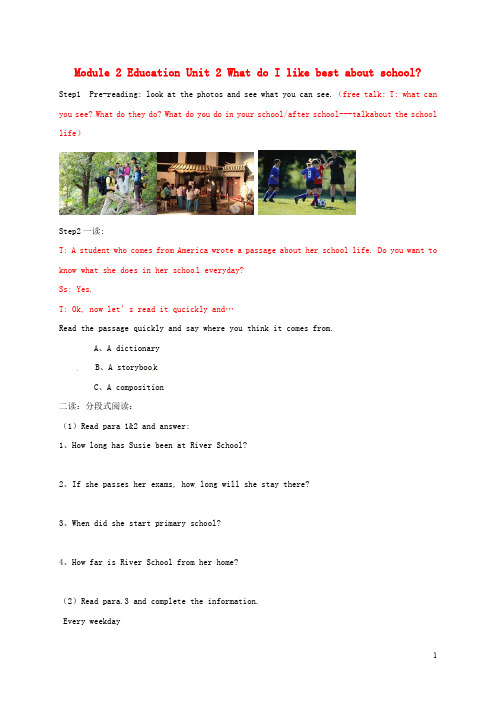
Module 2 Education Unit 2 What do I like best about school? Step1 Pre-reading: look at the photos and see what you can see.(free talk: T: what can you see? What do they do? What do you do in your school/after school---talkabout the school life)Step2一读:T: A student who comes from America wrote a passage about her school life. Do you want to know what she does in her schoo l everyday?Ss: Yes.T: Ok, now let’s read it qucickly and…Read the passage quickly and say where you think it comes from.A、A dictionaryB、A storyboo kC、A composition二读:分段式阅读:(1)Read para 1&2 and answer:1、How long has Susie been at River School?2、If she passes her exams, how long will she stay there?3、When did she start primary school?4、How far is River School from her home?(2)Read para.3 and complete the information.Every weekday2.Before class:then:The headteacher4. Lessons : begin:each lesson last:5. a break:6. then: another ______, then lunch ____________.7. two more lessons ____________.(3)Read para 4 and answer:1、汉译英:Some people learn German instead of French.2、What is luck y for her?(4)Read para 5, can you find out the after-school activities at River School? Step3 work in pairs. Talk about Susie Thompson’s weekday.Step4重点词组2.一所中学3.离。
山东省潍坊高新技术产业开发区浞景学校外研版九年级下册英语学案Module2 Unit1

Module 2 Education 学案Unit1 They don’t sit in rows.一、听力素材1 listen and complete the correct answers1) The weather was ____________ when Tony was in London .2) Tony played football with ________________.3) Daming is surprised to hear that Tony ______________.4) Tony didn’t go to lessons . He was __________________.二、对话处理1.Listen and choose1)Who are talking with Tony ?2) Did Tony enjoy himself in London?三、Read carefully and answer the questions1.Who did Tony visit in London ?2.How did Tony get the photos of Susie’s school?3.Which class is a bit bigger ,Susie’s or Daming’s ?4.What does Betty hope to do one day ?四.Complete the passage with the correct form of the words in the box.Pupils in England do not sit in (1)__________ in the classroom. They sit around tables .Everyone (2) ___________ a jacket and (3)___________. Most schools have sports grounds , and English children (4)________________ playing football, just as pupils in China do. Some English schools have swimming (5)____________, but not all of them do .四、语言知识1.everyone 每个人,人人everyone 为不定代词,意为“每个人,人人”,作为主语是,谓语动词用第三人称单数形式。
山东省潍坊高新技术产业开发区九年级英语下册Moudle1TravelUnit1Wetouredthe
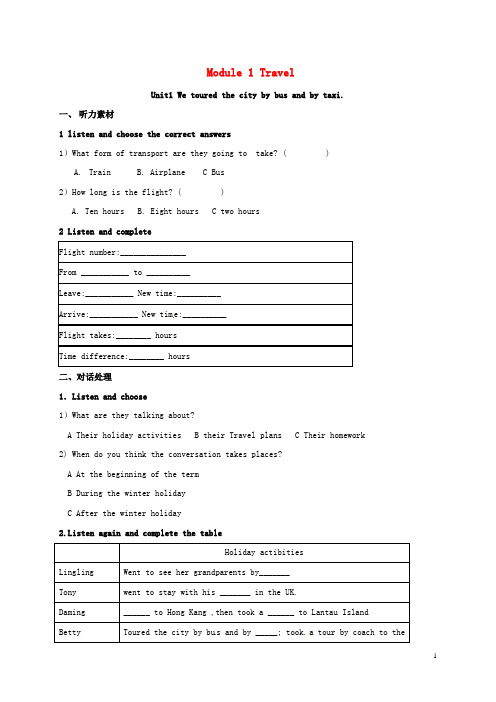
Module 1 TravelUnit1 We toured the city by bus and by taxi.一、听力素材1 listen and choose the correct answers1)What form of transport are they going to take? ( )A.TrainB. Airplane C Bus2)How long is the flight? ( )A. Ten hoursB. Eight hours C two hours2 Listen and completeArrive:___________ New tim二、对话处理1.Listen and choose1)What are they talking about?A Their holiday activitiesB their Travel plansC Their homework2) When do you think the conversation takes places?A At the beginning of the termB During the winter holidayC After the winter holiday2.Listen again and complete the tableToured the city by bu s and by _____; took a tour by coach to the三、Read carefully and answer the questions1How long did Lingling stand on the train on her trip back? 2Why is travel so difficult in winter?3Why will they get back to work?4What fun things can they do this term?四、Read and find out these phrases欢迎回来充满,装满倒霉因为,由于乘小船去--- 按时步行很长一段路回来学习学期末盼望,期盼玩的开心最好做某事只要五、语言知识1.The train was full of people---此句中be full of 意为“充满,装满---”,表状态,相当于be fille d with, for example: 瓶子里装满了水。
九年级英语下册 Module 2 Education Unit 2 What’s the best

Unit 2 What,s the best thing about school教学内容:1. Key vocabulary重点词汇和短语present, absent, speech, biology, safety, drug, Spanish, French, involve, training, society, disco, athletic, fortunately, secondary2. Key sentences重点句子If I pass my exams next ye ar, I’ll stay here until I’m 18.Park School is a secondary school, about 20 minutes by bike away from home.We spend the first 10 minutes in our classroom while our teacher checks which pupils are present or absent.PE involves physical exercise, basketball, training in the gym and swimming. 教学目的:1. To get information from the reading material about an English course.2. Know more about the summer training classes in other countries or camps Broaden the vision.教学重点:1.To learn some key words and expressions.2.To get information from the reading material about an English course.教学难点:The subject and object agreement.教学方法:Bottom-up approach.。
山东省潍坊高新技术产业开发区九年级英语下册Moudle4RulesandsuggestionsUni
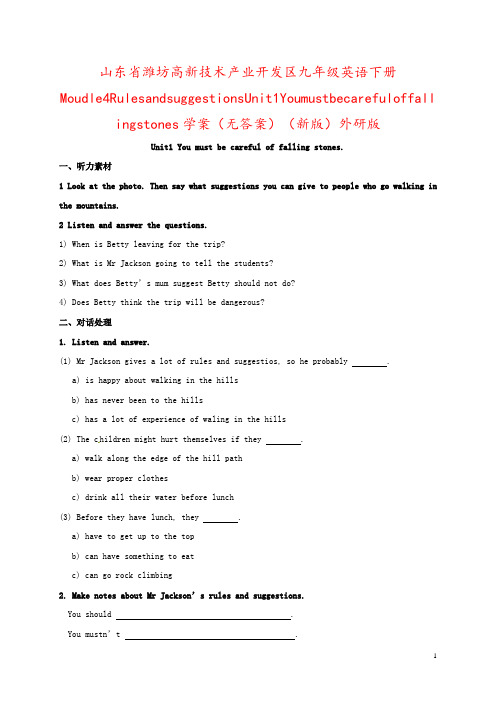
山东省潍坊高新技术产业开发区九年级英语下册Moudle4RulesandsuggestionsUnit1Youmustbecarefuloffall ingstones学案(无答案)(新版)外研版Unit1 You must be careful of falling stones.一、听力素材1 Look at the photo. Then say what suggestions you can give to people who go walking in the mountains.2 Listen and answer the questions.1) When is Betty leaving for the trip?2) What is Mr Jackson going to tell the students?3) What does Betty’s mum suggest Betty should not do?4) Does Betty think the trip will be dangerous?二、对话处理1. Listen and answer.(1) Mr Jackson gives a lot of rules and suggestios, so he probably .a) is happy about walking in the hillsb) has never been to the hillsc) has a lot of experience of waling in the hills(2) The c hildren might hurt themselves if they .a) walk along the edge of the hill pathb) wear proper clothesc) drink all their water before lunch(3) Before they have lunch, they .a) have to get up to the topb) can have something to eatc) can go rock climbing2. Make notes about Mr Jackson’s rules and suggestions.You should .You mustn’t .You have to .You mustn’t .You can’t .Don’t .You can’t .You must .三、Read carefully and complete the passage.you walk in the hills, you must wear strong shoes and socks. The walk may be fairly at the start because the path is , but later it may get difficult. You should also be careful of fallings from above.四、Read and find out these phrases动身;出发穿合适的衣服靠近山路的边缘走迷路离开一口气,一下子去攀岩当心落石领路变得困难五、语言知识看句子小组讨论总结各情态动词的用法①---Can you come this evening? ---Yes , I can /No, I can’tNo one could answer the question.拓展探究:区别can 和be able to的用法②You may take whatever you like in this room. You may do it right now.--May I watch TV now? --Yes, please. /Certainly. --No, you mustn’t.③May I keep the book for another week﹖ Could you tell me whom this bike belongs to ﹖Can I borrow your bike ?④—Must I finish the task right now?—Yes,you must. / Yes,you have to.—No,you needn’t. / No,you don’t have to.⑤拓展探究的 have to 和must 区别My brother was very ill, so I had to call the doctor in the middle of the night.M other is out,so I have to look after the shop.He said that they must work hard. We must find a good method to learn English well ⑥理解情态动词表推测的用法He may/might be at home, but I’m not sure.His name is on the cover of the book, It must be his.The light is off, our teacher can’t be in the office.⑦ You should be polite to your teachers. You shouldn’t waste any time.反馈练习:()1. John___ come to see us tonight, but he isn't very sure yet.A. mayB. canC. has toD. must()2. They ___ do well in the exam.A. can be able toB. be able toC. can able toD. are able to()3. -May I take this book out?-No, you___.A. can'tB. may notC. needn'tD. aren't()4. You___ go and see a doctor at once because you're got a fever.A. canB. mustC. dareD. would()5. -Can you speak Japanese? -No, I____.A. mustn'tB. can'tC. needn'tD. may not六、堂堂清Ⅰ.Fill in the blanks with the correct words.1 When you cross the street , you must obey the traffic r______.2 Advice is another way of saying s_________.3 A s_______ runs through the woods.4 What’s for the lunch ? I am s________.5 This ladder is not made of metal or wood but r______ .Ⅱ. Complete the sentences with the correct form.1. Mike has always w anted to go rock (cli mb).2. Children should be taught about (person) safety on the street.3. Unluckily, they got (lose) on the way there.4. —Did you have a go od time yesterday?—Yes. We enjoyed (we) very much.5. —Mum, I’m (starve)! Is dinner ready yet?—Sorry, my son. It’s nearly ready.III Translate the sentences.1. Handshake(握手) is a _______ of friendship.A. systemB. gestureC. suggestionD. move2. It is said that smoking is the second biggest _______ of death in the world.A. reasonB. excuseC. causeD. result3. The girl felt so______ that she fell _____as soon as she lay in the bed.A. sleepy; asleepB. sleepy; sleepyC. asleep; sleepyD. asleep; asleep4. He put forward(提出) a very good _______ at the meeting.A. adviceB. thoughtC. suggestionD. complain5. Mike,you ______ play with fire. You______ burn yourself.A. won’t;can’tB. mustn’t; mayC. d on’t have to; mustD. have got to;shouldn’t6. You ______ see the doctor, Joe. You don’t look very well.A. mustB. shallC. mayD. can7. —Must I clean the window now?—No, you ______. A.mustn’t B. eedn’t C. can’t D. may not8. Y ou mustn’t swim ___your own.A. ofB. onC. withD. in9. Harry has been reading all day —he ______ be tired.A. shouldB. has got toC. has toD. mustIV. Translate the sentences1. 注意!我有重要的事情告诉大家。
- 1、下载文档前请自行甄别文档内容的完整性,平台不提供额外的编辑、内容补充、找答案等附加服务。
- 2、"仅部分预览"的文档,不可在线预览部分如存在完整性等问题,可反馈申请退款(可完整预览的文档不适用该条件!)。
- 3、如文档侵犯您的权益,请联系客服反馈,我们会尽快为您处理(人工客服工作时间:9:00-18:30)。
Module 2 Education 学案
Unit1 They don’t sit in rows.
一、听力素材
1 listen and complete the correct answers
1) The weather was ____________ when Tony was in London .
2) Tony played football with ________________.
3) Daming is surprised to hear that Tony ______________.
4) Tony didn’t go to lessons . He was __________________.
二、对话处理
1.Listen and choose
1)Who are talking with Tony ?
2) Did Tony enjoy himself in London?
2.Listen again and complete the table
三、Read carefully and answer the questions
1.Who did Tony visit in London ?
2.How did Tony get the photos of Susie’s school?
3.Which class is a bit bigger ,Susie’s or Daming’s ?
4.What does Betty hope to do one day ?
四.Complete the passage with the correct form of the words in the box.
Pupils in England do not sit in (1)__________ in the classroom. They sit around tables .Everyone (2) ___________ a jacket and (3)___________. Most schools have sports grounds , and English children (4)________________ playing football, just as pupils in China
do. Some English schools have swimming (5)____________, but not all of them do .
四、语言知识
1.everyone 每个人,人人
everyone 为不定代词,意为“每个人,人人”,作为主语是,谓语动词用第三人称单数形式。
例如:Is everyone here? 大家都在这儿吗?
everyone与every one (everyone 只能用于指人,不能用于指物;every one既可指人,又可指物。
例如:Everyone in our class likes playing football 我们班人人都喜欢足球。
(2)every one 后可接of 短语,而everyone不可以。
Every one of us studies very hard. 我们每个人学习都很努力。
Everyone_______ here except Tom.
A. is
B. are
C. were
D. be
3.wear 穿着;戴着
wear为及物动词,意为“穿着带着”。
例如:she wears short hair. 她留着短发。
对应练习:
Most British high school children _______ uniforms at school.
A .wear
B dress
C put on
D dress up
3.enjoy 享受…….的乐趣;喜爱
Enjoy 为及物动词,意为“享受…….的乐趣;喜爱”,常构成短语:
(1)enjoy doing sth.喜爱做某事例如:the girl enjoys listening to music、那个女孩喜欢听音乐。
(2)enjoy oneself=have a good time 过得快乐,玩得高兴例如:
one can,t enjoy oneself if he is too tired. 一个人若太疲倦,就不可能玩的快乐。
、五堂堂清
Ⅰ.用所给词的适当形式填空
1.What do you like _______(good)about our school?
2.let,s go to the _______(swim)pool to swim
3.There are some photos of the school. Tony took them_______(he)
4.Their room is bigger than ______(us)
5.Is there_______(something)difficult in your study?
Ⅱ. 根据汉语意思完成英语句子
1.你在伦敦过得快乐吗?
Did you______ _______ in London?
2.英国的学校什么样?
_______are English schools ______?
3这儿有一些照片。
Here are ______ ______photos.
4哪个班更大一些,你的还是我的?
Which class is ______ ______ bigger ,_______ or_______?
5他们不成排坐着。
They don’t sit_______ _______
III 课后巩固提升
I.单项选择
1She is new here, so we know _______ about her.
A nothing
B something
C anything
D everything
2 He did quite well。
He made ________ mistakes.
A little
B few
C a little
D a few
3. I hope _______a teacher when I grow up.
A to be
B being
C is
D to being
4 we _______ have an excellent swimming team.
A too
B also
C as well
D either
5 we enjoy _______ football.
A play
B to play
C playing
D plays
II.用适当的介词填空
1.What is your father ________?
2.They are standing ________rows.
3.That means more people to play ________.
4.Everyone is sitting ________tables in the class-room in England.
5.What are you worried________?
6.。
